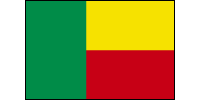| Country (long form) |
Republic of Benin |
| Capital |
Porto-Novo is the official capital; Cotonou is the seat of government |
| Total Area |
43,482.83 sq mi
112,620.00 sq km
(slightly smaller than Pennsylvania) |
| Population |
6,590,782 (July 2001 est.)
note: estimates for this country explicitly take into account the effects of excess mortality due to AIDS; this can result in lower life expectancy, higher infant mortality and death rates, lower population and growth rates, and changes in the distribution of population by age and sex than would otherwise be expected |
| Estimated Population in 2050 |
18,057,345 |
| Languages |
French (official), Fon and Yoruba (most common vernaculars in south), tribal languages (at least six major ones in north) |
| Literacy |
37.5% total, 52.2% male, 23.6% female (2000) |
| Religions |
indigenous beliefs 50%, Christian 30%, Muslim 20% |
| Life Expectancy |
49.02 male, 50.88 female (2001 est.) |
| Government Type |
republic under multiparty democratic rule |
| Currency |
1 Communaute Financiere Africaine franc (CFAF) = 100 centimes |
| GDP (per capita) |
$1,030 (2000 est.) |
| Industry |
textiles, cigarettes; beverages, food; construction materials, petroleum |
| Agriculture |
corn, sorghum, cassava (tapioca), yams, beans, rice, cotton, palm oil, peanuts; poultry, livestock |
| Arable Land |
13% |
| Natural Resources |
small offshore oil deposits, limestone, marble, timber |
|


|